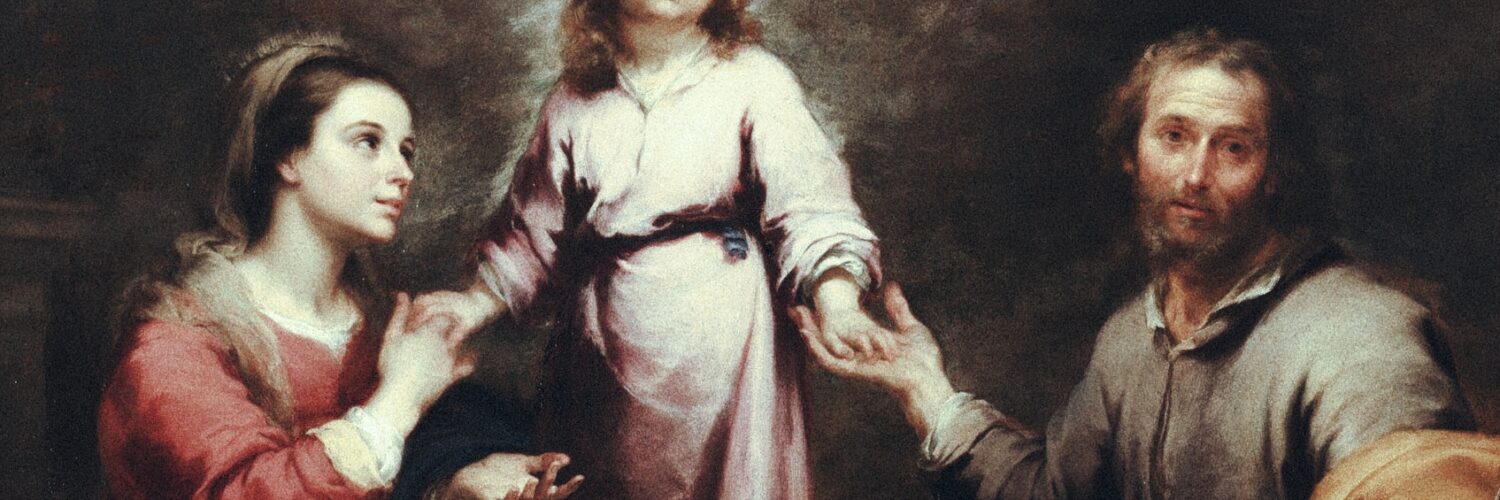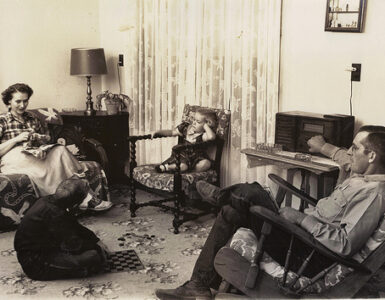One day a newspaper reporter saw a fire engine racing down the street; sensing a possible story, he followed it to a residential area where a house was on fire. Fortunately the family—a husband, wife, and their young son—had escaped safely; the three of them were standing in the street, watching their house burn to the ground while the firefighters tried to keep the flames from spreading to any other residences. The reporter felt sorry for the family, so he went up to the boy and said, “Son, it looks like you don’t have a home any more.” The boy answered, “We have a home; we just don’t have a house to put it in.” (James Hewett, Illustrations Unlimited, p. 197) That was an extraordinary answer by an ordinary person; it shows that, even under the worst circumstances, people who have love are capable of great wisdom and courage.
When we think of the Holy Family, we generally see them as if in a religious painting or icon; we hold them in awe, supposing that their life was very special and had nothing in common with ours. But what was it that made them special? In the Gospel of Luke (2:41-52) we don’t see Jesus or Mary or Joseph receiving any visions or revelations, nor do they work any miracles or accomplish any great or heroic deeds. We see only a family celebrating a religious festival, two concerned parents, and a child with a mind of his own—and none of this is miraculous or out of the ordinary. The Holy Family was holy not because of miracles or visions, but because they centered their lives around God, and shared this faith with one another.
Why is it God’s plan that children normally grow up as part of a family and then, as adults, begin new families of their own? On a human level, the answer is simple: children need loving adults to teach, direct, nurture, provide for, and protect them; when all these things happen, society is strengthened and blessed. On a spiritual level, families are meant to play an even more important role: helping and encouraging each member to come closer to God, so as to be ready for eternal life. In the Book of Samuel (1 Samuel 1:20-22, 24-28), Hannah recognized that her son Samuel was an immense gift from God, and in her gratitude she offered him to the Lord’s service; Samuel in turn fulfilled his destiny by becoming a great prophet. Parents are indeed called to help their children discover and respond to their vocation; when they do, the Church and the world are blessed. Mary and Joseph did this for Jesus when He was twelve; they didn’t yet completely understand His divine calling or mission, but they knew Jesus didn’t belong only to them, and they provided a holy and loving home in which He could advance in wisdom and divine favor in preparation for His public ministry. Families are truly blessed when the parents strive to do this. As St. John (1 John 3:1-2, 21-24) says, we are God’s children now, and—if we obey His commandments and put our faith into practice—one day we will understand the Lord’s plan and rejoice that we were honored to play a wonderful and important role in it.
All this may sound rather idealistic or abstract—but we are given opportunities to make it very realistic and down-to-earth—most especially by simply being there for one another. A religious author and speaker, a woman named Carol, once wrote: “One day when [my son] Jason was young, we were eating breakfast together. I had on an old pair of slacks and a fuzzy old sweater. He flashed his baby blues at me over his cereal bowl and said, ‘Mommy, you look so pretty today.’ I didn’t even have makeup on! So I said, ‘Honey, why would you say I look pretty today? Normally I’m dressed up in a suit and high heels.’ And he said, ‘When you look like that, I know you’re going some place; but when you look like this, I know you’re all mine’” (Craig Brian Larson, 750 Engaging Illustrations, p. 220).
Being present for our family members in ordinary, everyday situations, and sharing in their successes and setbacks, their joys and their sorrows, can truly make all the difference—not only by creating warm and happy memories, but by helping each other learn to believe in, experience, and share God’s love. When happiness is shared within our homes, joy is multiplied; when sorrow is shared within our families, burdens can become lighter. Each of these experiences are intended by God to be occasions of grace, and thus, part of our preparation for eternity.
What are the difficulties your family faces? What would Jesus, Mary, and Joseph do in your situation? They faced difficulties, too—but they used them as opportunities to come closer to God. They didn’t keep their faith private; they freely shared it with others, and this made the difference in their lives. It shouldn’t take a potential setback or tragedy, like the burning down of our house or the serious illness of a loved one, to make us appreciate the members of our family; we must learn to value and treasure them in the events of daily life, so that—with them—we may one day call Heaven our true home. In this, the Holy Family is a model for us, and today we ask in a special way for their guidance, blessing, and protection.






























